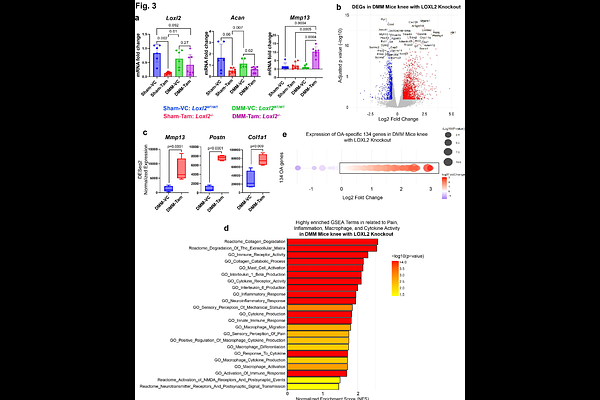LOXL2 alleviates post-traumatic knee osteoarthritis and pain

LOXL2 alleviates post-traumatic knee osteoarthritis and pain
Ali, F.; Raut, R. D.; Choudhury, C.; Chakraborty, A. K.; Del Valle-Ponce De Leon, C.; Mehra, P.; Bais, M. V.
AbstractCartilage has limited potential for self-regeneration, and damage can lead to structural, molecular, and functional aberrations, leading to osteoarthritis (OA). Traumatic knee injuries can also lead to cartilage degeneration and post-traumatic OA (PTOA). This study aimed to explore whether lysyl oxidase-like 2 (LOXL2) deletion promotes PTOA-induced transcriptional changes similar to those in human OA, as well as the upregulation of collagen degradation, inflammation, and pain-related gene networks. LOXL2 was found to be downregulated in mouse knee PTOA. Aggrecan promotes specific deletion of Loxl2 in knee cartilage, shows OA-like molecular changes, and aggravates mouse PTOA. Furthermore, transcriptional analysis revealed the upregulation of cartilage degeneration factors, signatures of inflammatory M1 macrophages, and pain. These Loxl2 deleted PTOA mice have a molecular resemblance to the human knee OA pathogenic gene signature, which could lead to OA and pain. Interestingly, intra-articular injection of adenovirus-delivered LOXL2 rescued knee joint function, alleviated cartilage degeneration, restored treadmill-running capabilities, and reduced mechanical allodynia by relieving knee joint disability and pain. Taken together, LOXL2 deletion in mice knee promotes the severity PTOA, similar to human OA, implying its potential as a therapeutic candidate for human PTOA.